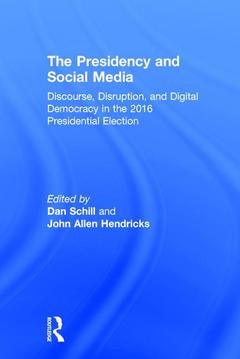The Presidency and Social Media Discourse, Disruption, and Digital Democracy in the 2016 Presidential Election
Coordonnateurs : Schill Dan, Hendricks John Allen

The media have long played an important role in the modern political process and the 2016 presidential campaign was no different. From Trump?s tweets and cable-show-call-ins to Sander?s social media machine to Clinton?s "Trump Yourself" app and podcast, journalism, social and digital media, and entertainment media were front-and-center in 2016. Clearly, political media played a dominant and disruptive role in our democratic process. This book helps to explain the role of these media and communication outlets in the 2016 presidential election.
This thorough study of how political communication evolved in 2016 examines the disruptive role communication technology played in the 2016 presidential primary campaign and general election and how voters sought and received political information. The Presidency and Social Media includes top scholars from leading research institutions using various research methodologies to generate new understandings?both theoretical and practical?for students, researchers, journalists, and practitioners.
Foreword [Thomas E. Patterson] Preface Part 1: Media Use: Political Engagement & Digital Democracy 1. Discourse, Disruption, and Digital Democracy: Political Communication in the 2016 Presidential Campaign [Dan Schill and John Allen Hendricks] 2. Social Media, News Platforms, and Partisan Exposure: Voters’ Media Preferences During the 2016 Presidential Campaign Season [Michael A. Beam, Paul M. Haridakis, Myiah J. Hutchens, and Jay D. Hmielowski] 3. Trump Supporters vs. Republican Voters: How Frustration with the Media Separated the GOP in 2016 [Sharon E. Jarvis and Jay T. Jennings] 4. Online Communication Regarding Ohio’s 2016 Presidential Primary [Jeffrey H. Kuznekoff, Leland G. Spencer, and Robert N. Burt] Part 2: Media Effects: Traditional Media & Social Media Distribution 5. Foreign Policy and Presidential Elections: A Look at the Iowa Caucuses [Raluca Cozma] 6. The Effects of Political Social Media Use on Efficacy and Cynicism in the 2016 Presidential Election: Exploring the Possibility of a Reinforcing Spiral [Benjamin R.Warner, Molly M. Greenwood, Freddie J. Jennings, and Josh C. Bramlett] 7. Streaming entertainment and talking politics: Social television in the shaping of online and offline political talk during the 2016 campaign [Sarah Krongard and Jacob Groshek] Part 3: Candidate Discourse in Social Media: Image, Tone, & Rhetoric 8. The Verbal Tone of the 2016 Presidential Primaries: Candidate Twitter, Debate, and Campaign Speech Rhetoric [David Lynn Painter and Katherine Rizzo] 9. Themes in Candidate Messaging on Twitter During the ‘Invisible’ Presidential Primary[Kate Kenski and Christine R. Filer] 10. Rhetoric in a Transmedia Storytelling Campaign: How Trump Deployed the Paranoid Style in 2016 [Zac Gershberg] 11. Humor use and Policy Mentions in Candidate Interviews across Talk-show Sub-Genres in the 2016 Presidential Election [Dannagal G. Young and Johanna M. Lukk] Part 4: Social Media Messaging: Candidate Branding & Agenda Setting 12. Donald Trump and the "Oxygen of Publicity": Branding, Social Media, and Traditional Media [Sarah Oates and Wendy W. Moe] 13. The Infographic Election: The Role of Visual Content on Social Media in the 2016 Presidential Campaign [Terri L. Towner] 14. Tweets as Tools: Exploring the Campaign Functions of Candidates’ Tweets in the 2016 Presidential Campaign[Thomas Kim Hixson] Part 5: Social Media Content: Political Participation & Humor 15. Internet Memes as Polyvocal Political Participation [Andrew S. Ross and Damian J. Rivers] 16. Engaged Brigade: Digital Platforms and Millennial Engagement in the 2016 Election [Alison N. Novak] 17. Donald Trump and the Late-Night Political Humor of Campaign 2016: All The Donald, All the Time [Stephen J. Farnsworth, S. Robert Lichter, and Deanne Canieso]
Dan Schill is Associate Professor in the School of Communication Studies and Affiliate Professor in Political Science at James Madison University, where he teaches courses in advocacy, political communication, research methods, and media and politics. His research focuses on communication, politics, media, and technology.
John Allen Hendricks is Chair of the Department of Mass Communication and Professor at Stephen F. Austin State University, where he teaches courses in communication theory, research methods, First Amendment law, and media and politics. Dr. Hendricks has authored/edited more than ten books on the topics of media/politics, social media/new media technologies, and the broadcasting industry.
Date de parution : 10-2017
15.2x22.9 cm
Date de parution : 10-2017
15.2x22.9 cm
Thème de The Presidency and Social Media :
Mots-clés :
Talking Politics Online; American Politics; NBC News; Media; Candidate Tweets; Media and Politics; Late Night Comedy Shows; New Media; Late Night Comedy; New Media Technology; Social Media; Presidential Primary Candidates; 2016 Election; Negative Relationship; US Politics; General Presidential Election Campaigns; Presidency; Pie; Hillary Clinton; Political Communication Scholars; Donald Trump; Twitter’s API; Campaigns and Elections; Primary Period; Political Humor; Presidential Primary; Republican Party; Face Book; Democratic Party; Facebook; Political Communication; Transmedia Storytelling; Political Participation; Candidate Information; Digital Democracy; Political Information; Presidential Elections; Candidate Partisanship; Presidential primaries; External Political Efficacy; Rhetoric; Late Night Comics; Twitter; Picture Superiority Effect; John Allen Hendricks; Internet Memes; Michael A; Beam; Invisible Primary; Paul M; Haridakis; Myiah J; Hutchens; Jay D; Hmielowski; Sharon E; Jarvis; Jay T; Jennings; Jeffrey H; Kuznekoff; Leland G; Spencer; Robert N; Burt; Raluca Cozma; Benjamin R; Warner; Molly M; Greenwood; Freddie J; Jennings; Josh C; Bramlett; Sarah Krongard; Jacob Groshek; David Lynn Painter; Katherine Rizzo; Kate Kenski; Christine R; Filer; Zac Gershberg; Dannagal G; Young; Johanna M; Lukk; Sarah Oates; Wendy W; Moe; Terri L; Towner; Thomas Kim Hixson; Andrew S; Ross; Damian J; Rivers; Alison N; Novak; Stephen J; Farnsworth; S; Robert Lichter; Deanne Canieso



